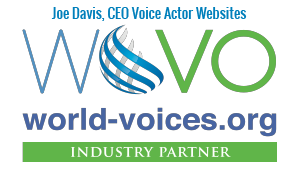The following are a list of factors that Google’s algorithm takes into account when deciding how to rank a voice over website.
E-A-T Factors (Expertise, Authoritativeness, Trustworthiness.)
– Expertise: In this context, expertise means you need to show a high level of knowledge and skill in voice over and the other areas/concepts mentioned on your website. An indication for Google of a person’s Expertise can be shown on a site if the content is truthful and useful for visitors.
– Authoritativeness: It is important to show that you are an authority or the authoritativeness of the creator of the content on your website. This is done through things like credentials and personal experiences such as testimonial and reviews.
– Trustworthiness: Your visitors (and Google) need to know they can trust the creator of the content and the website. Trustworthiness is even more important when you are giving your clients the ability to pay for your voice over services via your website. Example of trustworthiness are a privacy policy, SSL certificate and contact information.
This acronym first appeared when Google’s Search Quality Guidelines was leaked in 2014. Google has now publicly said that E-A-T is among the top 3 considerations for Page Quality.
Domain Ranking Factors
– Domain Age: Matt Cutts from Google has publicly said that “The difference between a domain that’s six months old versus one year old is really not that big at all.” So we know that age is taken into account in ranking, but is not a huge factor.
– Keyword Appears in the Top Level Domain (www.keywordhere.com): This used to be more significant ranking factor but still acts as a relevancy signal.
– Keyword As the First Word in Domain: Domain names that begin with a specific keyword have some advantage in ranking for that specific keyword over websites that do not contain the keyword or have it appear somewhere else other than the beginning.
– Domain Registration Length: Google has a patent read reads: “Valuable (legitimate) domains are often paid for several years in advance, while doorway (illegitimate) domains rarely are used for more than a year. Therefore, the date when a domain expires in the future can be used as a factor in predicting the legitimacy of a domain.”
– Keyword in Subdomain: It is widely considered that a keyword appearing in the subdomain does provide a boost in website ranking.
– Domain History: A website that has changed hands a lot or was registered and let go multiple times, may tell Google to “reset” the site’s history and the benefits that go along with it. This can negate previous links pointing to the domain.
– Exact Match Domain: Exact Match Domains can a small positive impact on rankings for those particular keywords. The Google EMD update largely did away with this ranking signal.
– Public vs. Private Domain WhoIs: Having your domain registration set as private, could be a sign to Google that you have “something to hide”. Matt Cutts from Google is quoted as saying: “…When I checked the whois on them, they all had “whois privacy protection service” on them. That’s relatively unusual. …Having whois privacy turned on isn’t automatically bad, but once you get several of these factors all together, you’re often talking about a very different type of webmaster than the fellow who just has a single site or so.”
– Penalized Domain WhoIs Owner: Google may identify a particular person as a source of spam. If it does, that can potentially work against a website owner.
– Domain Country TLD extension: Using a Country Code Top Level Domain (.us, .co.uk, .ca) can help a website rank well in that particular country. It can have negative impact on ranking in other countries.
Page-Level Ranking Factors
– Keyword in Title Tag: The title tag remains an important part of on-page SEO. This ranking signal should be leveraged on every page of your website and include your keywords.
– Title Tag Starts with Keyword: According to Moz , title tags that starts with a keyword tend to perform better than title tags with the keyword towards the end of the tag.
– Keyword in Meta Description Tag: It is generally considered that Google doesn’t use a website’s meta description tag as a direct ranking signal. But, the meta description tag can have an impact on the click-through-rate of users from search engines and click-through-rate is an important ranking factor.
– Keyword Appearing in H1 Tag: The H1 tags are viewed by Google as a “second title tag”. Google uses a website’s H1 tag as a secondary relevancy signal.
– TF-IDF: This refers to “How often does a certain word appear in a document?”. In general, the more often that a word appears on a particular page, the more likely that Google will think the page is about that word. This does not mean you should keyword stuff and put the same word many times on a page.
– Content Length: A webpage with more words on it is usually considered to have a better breadth and depth of information. In SEO studies, websites with more content and a larger number of words per page generally perform better in search results.
– Table of Contents: Having a linked table of contents gives Google a guide to more easily understand your website content. It can also convince Google to show sitelinks for your site.
– Keyword Density: This was a more important ranking signal in the past, but Google still uses it to some extent to figure out what a website is about. Keyword stuffing on a page can hurt you though, so be careful.
– Latent Semantic Indexing Keywords in Content (LSI): Search engines use LSI keywords by extracting meaning from words that have more than one meaning. For example: Oranges are delicious VS Orange is my favorite color. The presence/absence of LSI may act as a signal for quality of the content as well.
– LSI Keywords in Title and Meta Description Tags: Using LSI keywords in your voice over page meta tags can help search engines understand the difference between words with multiple meanings. For example: Oranges are delicious VS Orange is my favorite color. They can also be used as a relevancy signal.
– Page Covers the Voice Over Topic In-Depth: There is a strong correlation between how in depth a page covers a topic and how a search engine will rank a page. So a page that covers many or all aspects of a topic, tends to rank better.
– Page Loading Speed: All major search engines use the speed that a webpage loads as a ranking signal. The faster the better. A search engine robot calculates your site load time based on HTML, javascript, CSS and more.
– Chrome Browser Page Loading Speed: It is theorized that Google may use Chrome user data to better understand a site’s loading time. That way, they can measure how quickly a page actually loads to users.
– AMP Pages: Google has not indicated that AMP has a direct impact on ranking in the regular search results. However, AMP can be important to have an article appear in the in the mobile version of Google News.
– Entity Match: Search engines look if a webpage’s content matches the “entity”, in this case perhaps a particular voice actor, that a user is looking for? If the website is by that entity, it is possible that it will get an increase in ranking for that keyword.
– Google Hummingbird: The hummingbird algorithm update enabled Google to better understand topics expressed on a website, not just keywords.
– Duplicate Content: The reuse of content already appearing on a website, can have a negative impact on ranking. Google will often penalize a website for using the some content multiple times. Content that is not 70 percent or more unique runs the risk of being penalized.
– Rel=Canonical Tag: The Canonical tag is a way for the owner of website content to let Google know that it appears in multiple places and to only give credit for the content in one of those places. This is a way to use the same content multiple times and not get a penalty from Google.
– Image Optimization: Having images optimized on your website can help with search engines relevancy signals. Ways to optimize images include file size, file name, alt text, title, description and caption.
– Recent Content: The Google Caffeine algorithm update gives some preference to recently published or updated content. This is especially true for time-sensitive searches, such as something that has happened in the news. For example the video game voice actors strike. Google will sometimes display the date of a particular page’s last update.
– Extent of Content Updates: The amount of content that is edited also works as a freshness factor. Adding, editing or removing entire sections will generally have more of an impact than changing the order of several words or correcting a typo.
– Historical Page Updates: The frequency a page has been updated over time is a ranking factor. The more frequent the better. Daily, weekly, monthly, yearly, etc. The frequency of content updates also contributes to freshness.
– Keyword Prominence: The closer to the top of the page that a keyword appears, generally the more value Google attributes to that keyword. It is a good idea to have your most important keywords appear in the first 100 words of a page.
– Keyword in HTML headings H!, H2, H3 Tags: H1 are heading tags, H2 subheading tags, etc. A keyword appearing in these tags is another potential relevancy signal. Google employee John Mueller has said “These heading tags in HTML help us to understand the structure of the page.”
– Outbound Link Quality: Just like you want high quality websites linking to you, the websites you link out to show also be good quality. This helps with the trustworthiness of your website. This falls under the category of trust signals, which is a ranking factor.
– Theme of Outbound Links: It is believed that Google can use the content of the pages you link out to as a relevancy signal. For example, if you have a page on “Audiobooks” that links to a narration related page, this can serve to tell Google your page is about “Audiobook Narration”, not just simply “Audiobooks”.
– Grammar and Spelling: Using correct grammar and spelling serves as a quality signal for Google.
– Original Content: If the content on your page is not original, meaning it was copied from somewhere else, it generally won’t perform well in Google.
– Mobile-Friendly: Also known as “Mobilegeddon”, this Google algorithm update favors websites that are optimized for mobile devices such as cell phones and tablets.
– Mobile-first Index: In 2018, Google introduced mobile-first indexing. This means Google is now using the mobile version of a website to calculate rank instead of the traditional “desktop” version.
– Mobile Hidden Content: Content that does not appear on mobile devices (only shows on a computer) has a strong possibility of not get indexed, or weighed as heavily. This means your important keywords and text based content that is used for SEO should always appear on all devices.
– Useful Supplementary Content: Content that enhances the user ability to engage with the information on a page can be used as an indicator of a website’s quality. For example a script timer or a Union rate calculator.
– Tabbed Hidden Content: If content does not appear on a page until a tab is clicked, this can be considered hidden content and Google has said this may cause Google to not index the content. This is different than having content on multiple pages, which is actually considered a positive.
– Quantity of Outbound Links: Having a large outbound VS inbound link ratio can be detrimental to rankings. In other words don’t have way more links going out from your site than links pointing to your page from other websites.
– Multimedia: Images, audio, videos and other media embedded on a website can work as a content quality signal. A website that is rich in mixed content helps enhance the “quality” of a website.
– Internal Links to a Page: The amount of internal links to a particular page shows Google the importance of that page in relationship relative to other pages on the site. An internal link is a when one page on a particular website links to another page on the same website.
– Quality of Internal Links to a Page: Links pass on authority (the positive signals) from one page to another. When internal links point from a high authority page to a lower authority or more recent page, they pass on some of that authority to the page that is being linked to.
– Broken Links: Humans don’t like broken links, neither does Google. If a website has links that don’t work anymore, that can be a sign of a low quality or abandoned website.
– Reading Level: Google does look at the reading level of a website. There is a widely accepted view that content which is written at “too high a reading level” may not rank as well. That doesn’t mean you should dumb down your text. It just helps if it isn’t too complicated.
– Affiliate Links: For many voice talent this isn’t an issue. But some do use affiliate links and so this is worth mentioning. Websites that have a lot of affiliate links usually aren’t penalized but Google may look closer at other quality signals to ensure it is not a website light on content and heavy on affiliate links.
– HTML errors/W3C validation: A large number of errors in HTML code can be an indication of a poor quality website. It is always good practice to have a well coded website. It is believed that Google ranks sites with well written code better than sites with shoddy code.
– Domain Authority: Domain Authority (DA) is a search engine ranking score that goes from one to one hundred. The higher the score, generally means the better the ability of the website to rank well.
– PageRank (PR): PR is a mathematical algorithm that evaluates the quality and quantity of links to a webpage. It was created by Google founders Larry Page and Sergey Brin.
– URL Length: Long URLs can act as a negative impact on ranking. A number of studies have shown that shorter URLs tend to have somewhat of an advantage over longer ones.
– URL Path: A page that does not have many levels in the URL between the main part of the domain and the page can benefit from an authority boost. For example “www.domain.com/commercial” is better than “www.domain.com/genres/voice-over/commercial”.
– Keyword in URL String: Having your keywords appear in the URL is a relevancy signal. So, if you are trying to rank well for “female commercial voice over” then it would make sense to name your commercial page in the following way “www.domain.com/female-commercial-voice-over”.
– Bulleted and Numbered Lists: These types of lists are considered good for the user experience and are thought of as having a positive impact on rank.
– Age of a Page: An older page that is updated on a regular basis will often rank better than a brand new page.
Site-Level Ranking Factors
— Contact Page: Google has said that they like sites that have an “appropriate amount of contact information”. This counts as a trust signal. The more contact information you provide to your visitors, the most trustworthy your site may be viewed as by Google’s algorithm.
This list is continually being updated and added to.



